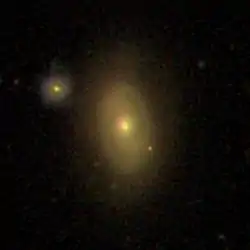| NGC 3925 | |
|---|---|
 SDSS image of NGC 3925. | |
| Observation data (J2000 epoch) | |
| Constellation | Leo |
| Right ascension | 11h 51m 20.9s[1] |
| Declination | 21° 53′ 21″[1] |
| Redshift | 0.026482[1] |
| Heliocentric radial velocity | 7939 km/s[1] |
| Distance | 370 Mly (113 Mpc)[1] |
| Apparent magnitude (V) | 15.3[1] |
| Characteristics | |
| Type | SAB0/a[1] |
| Size | ~128,000 ly (39.3 kpc) (estimated)[1] |
| Apparent size (V) | 0.65 x 0.45[1] |
| Other designations | |
| PGC 037078, MCG +04-28-071[1] | |
NGC 3925 is a barred[2] lenticular galaxy[3][2] and a ring galaxy[2] located about 370 million light-years away[3] in the constellation Leo. It was discovered by astronomer Heinrich d'Arrest on February 19, 1863.[4]
NGC 3925 is classified as a "PAS galaxy" because it contains mostly old stars, with no observable star formation activity. NGC 3925 is also a member of the Coma Supercluster.[5]
See also
References
- 1 2 3 4 5 6 7 8 9 10 "NASA/IPAC Extragalactic Database". Results for NGC 3925. Retrieved 2020-05-17.
- 1 2 3 "HyperLeda -object description". leda.univ-lyon1.fr. Retrieved 2020-05-17.
- 1 2 "Your NED Search Results". ned.ipac.caltech.edu. Retrieved 2020-05-17.
- ↑ "New General Catalog Objects: NGC 3900 - 3949". cseligman.com. Retrieved 2020-05-16.
- ↑ Gavazzi, Giuseppe; Savorgnan, Giulia; Fumagalli, Mattia (October 2011). "The complete census of optically selected AGNs in the Coma Supercluster: the dependence of AGN activity on the local environment". Astronomy & Astrophysics. 534: A31. arXiv:1107.3702. Bibcode:2011A&A...534A..31G. doi:10.1051/0004-6361/201117461. ISSN 0004-6361.
External links
 Media related to NGC 3925 at Wikimedia Commons
Media related to NGC 3925 at Wikimedia Commons- NGC 3925 on WikiSky: DSS2, SDSS, GALEX, IRAS, Hydrogen α, X-Ray, Astrophoto, Sky Map, Articles and images
This article is issued from Wikipedia. The text is licensed under Creative Commons - Attribution - Sharealike. Additional terms may apply for the media files.